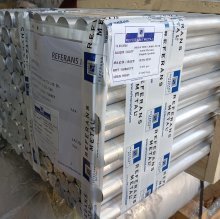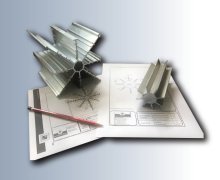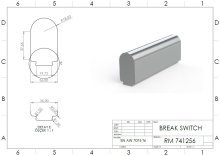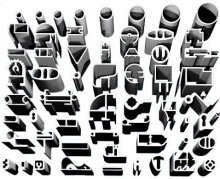



1200
BS 3L54 / Al99 / 1200 / F
| Chemical Properties | % Value |
| Silicon (Si) | 0,00 - 1,00 |
| Manganese (Mn) | 0,00 - 0,05 |
| Copper (Cu) | 0,00 - 0,05 |
| Lead (Pb) | 0,00 - 0,05 |
| Titanium (Ti) | 0,00 - 0,05 |
| Iron (Fe) | 0,00 - 0,50 |
| Zinc (Zn) | 0,00 - 0,10 |
| Aluminium (Al) | Balance |
| Physical Properties | Value |
| Density | 2.70 g/cm³ |
| Melting Point | 657 °C |
| Thermal Expansion | 23.4 µm/m.°C |
| Modulus of Elasticity | 69 GPa |
| Thermal Conductivity | 225 W/m.K |
| Electrical Resistivity | %58.5 IACS |
| Mechanical Properties | Value |
| Proof Strength | 28 MPa |
| Yield Strength | 85 MPa |
| Shear Strength | 54 MPa |
| Elongation A50 mm | 23% |
| Hardness | 27 HB |
The 1200 F aluminum alloy is known for its excellent machinability, outstanding corrosion resistance, and low mechanical strength. The F temper refers to the cold-worked form of the alloy, making 1200 F highly flexible and easily shapeable. These characteristics make 1200 F aluminum alloy ideal for applications such as electrical devices, packaging materials, heat exchangers, outdoor structures, and general engineering uses. Additionally, 1200 F is suitable for anodizing, which enhances its surface appearance while increasing its corrosion resistance.
In terms of weldability, 1200 F aluminum alloy can be welded with ease. Its soft structure and low hardness simplify the welding process and ensure strong connections. Regarding bending, 1200 F aluminum alloy is highly flexible and easily formable. Due to its low hardness, this alloy is one of the easiest aluminum alloys to bend, making it suitable for a wide range of applications.
The corrosion resistance of 1200 F aluminum alloy is excellent. It performs well against atmospheric conditions and corrosive environments, such as seawater, making it suitable for outdoor and maritime applications. However, the use of 1200 F in high-vibration environments may be limited, as its low mechanical strength may result in performance degradation under such conditions.
The advantages of 1200 F aluminum alloy include excellent machinability, high corrosion resistance, and anodizing compatibility. However, its low mechanical strength makes it unsuitable for applications requiring high load-bearing capacity and durability. Additionally, its performance in high-vibration environments may be limited. Despite these drawbacks, the low cost and high machinability make 1200 F aluminum alloy an ideal choice for lightweight applications and aesthetic purposes.
Choosing Factors For 1200 F
- Strength: Low
- Machining: Poor
- Weldability: Perfect
- Formability: Exquisite
- Corrosion Resistance: Very good
- Heat Treating: None
Some Well-Known Applications for 1200 F
On railway vagons,
In the mechanical-chemical industry,
It is also used in shipbuilding and as a component of holloware.
- Sheets
- Tube/Profile

 Weight Calculator
Weight Calculator

